Introduction
Getting a good night’s sleep is essential for physical and mental health. Without enough sleep, we can be irritable, moody, and lack the energy needed to get through the day. Unfortunately, it can be difficult to go to bed and stay asleep throughout the night. This article explores tips for getting a good night’s sleep, including making a sleep schedule, avoiding caffeine and stimulants, creating a relaxing bedtime routine, reducing exposure to bright screens, and exercising during the day.
Make a Sleep Schedule and Stick to It
Having a set sleep schedule is one of the best ways to ensure that you get enough rest. Going to bed and waking up at the same time each day helps to regulate your body’s internal clock, which can make it easier to fall asleep and wake up in the morning. Additionally, having a sleep schedule makes it easier to determine when you should take naps or catch up on missed sleep.
When creating a sleep schedule, it’s important to consider your lifestyle and daily activities. Make sure that you’re going to bed early enough to get at least seven to nine hours of sleep per night. You may also want to use an alarm or timer to help you stick to your schedule.

Avoid Caffeine and Stimulants Close to Bedtime
Caffeine and other stimulants, such as nicotine and alcohol, can make it more difficult to fall asleep and stay asleep throughout the night. If you’re someone who enjoys coffee, tea, or energy drinks, try to limit your intake to earlier in the day. Try to avoid consuming any caffeine after 2 pm, and switch to decaf or herbal teas in the evening.
If you’re a smoker, try to quit or at least cut back on smoking before bedtime. Nicotine is a stimulant that can interfere with sleep. Similarly, alcohol should also be avoided close to bedtime. Although it can make you feel drowsy, it can disrupt your sleep cycle and prevent you from getting quality rest.

Create a Relaxing Bedtime Routine
Establishing a relaxing bedtime routine can help signal to your body that it’s time to wind down and prepare for sleep. This could include taking a warm bath, reading a book, listening to soothing music, or doing some light stretching or meditation. Avoiding strenuous activities or using electronics close to bedtime is also important.
Creating a pre-bed ritual can help train your mind and body to relax and prepare for sleep. When your body recognizes these cues, it will become easier to drift off into a deep sleep.

Reduce Exposure to Bright Screens Before Bed
Exposure to bright screens, such as TVs, computers, phones, and tablets, can make it more difficult to fall asleep. The blue light emitted by these devices can interfere with the production of melatonin, a hormone that helps regulate sleep. It’s best to avoid using these devices at least an hour before bedtime.
If you do need to use a device close to bedtime, try to dim the brightness and/or wear blue-light-blocking glasses. Additionally, you can set your device to “night mode” or “dark mode” to reduce the amount of blue light emitted.
Exercise During the Day
Regular exercise is important for physical and mental health. Exercise can help improve sleep quality and promote better overall health. However, it’s important to avoid exercising too close to bedtime, as this can cause a surge of energy that can make it difficult to fall asleep. Try to finish your workout at least three hours before bedtime.
When exercising, focus on low-impact activities such as walking, yoga, or swimming. These types of activities are less likely to cause a spike in energy levels and can be beneficial for promoting relaxation and better sleep.
Conclusion
Getting a good night’s sleep is essential for physical and mental health. Establishing a regular sleep schedule, avoiding caffeine and stimulants, creating a relaxing bedtime routine, reducing exposure to bright screens, and getting regular exercise during the day can all help improve your sleep quality. With a few simple changes, you can start getting the restful sleep you deserve.


